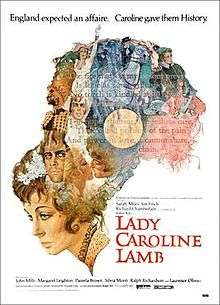Lady Caroline Lamb (film)
Lady Caroline Lamb is a 1972 British epic romantic drama film based on the life of Lady Caroline Lamb, lover of Lord Byron and wife of William Lamb, 2nd Viscount Melbourne (later Prime Minister). The only film written and directed by Robert Bolt, it starred his wife, Sarah Miles,[1] as Lady Caroline, Jon Finch, Richard Chamberlain, Laurence Olivier, Ralph Richardson, John Mills, Margaret Leighton and Michael Wilding.
| Lady Caroline Lamb | |
|---|---|
 Theatrical release poster | |
| Directed by | Robert Bolt |
| Produced by | Franco Cristaldi Fernando Ghia Bernard Williams |
| Written by | Robert Bolt |
| Starring | Sarah Miles Jon Finch Richard Chamberlain Laurence Olivier |
| Music by | Richard Rodney Bennett |
| Cinematography | Oswald Morris |
| Edited by | Norman Savage |
Production company | Pulsar Productions |
| Distributed by | MGM-EMI (UK) United Artists (US) |
Release date | 22 November 1972 |
Running time | 123 minutes |
| Country | United Kingdom |
| Language | English |
Plot Synopsis
The film describes the life of Lady Caroline Lamb (Sarah Miles) after she marries William Lamb (Jon Finch). Later she meets and falls in love with Lord Byron (Richard Chamberlain), but when he deserts her for a younger woman Miss Millbanke (Silvia Monti), she descends into madness. At the end of the film she dies from a broken heart.
Cast
- Sarah Miles as Lady Caroline Lamb
- Jon Finch as William Lamb
- Richard Chamberlain as Lord Byron
- John Mills as Canning
- Margaret Leighton as Lady Melbourne
- Pamela Brown as Lady Bessborough
- Silvia Monti as Miss Millbanke
- Ralph Richardson as King George IV.
- Laurence Olivier as Duke of Wellington
- Michael Wilding as Lord Holland
- Peter Bull as Minister
- Charles Carson as Potter
- Sonia Dresdel as Lady Pont
- Nicholas Field as St. John
- Trevor Peacock as Boxing Agent
- Norman Mitchell as Waiter
- Bernard Kay as Benson
- Caterina Boratto
- Felicity Gibson as Girl in Blue
Background
The film was the directorial debut of screenwriter Robert Bolt and starred his wife Sarah Miles in the title role. Bolt did not direct another film. The film is also notable because it is the last film in which Michael Wilding appeared, in a cameo with his last wife, Margaret Leighton, who played Lady Melbourne. The film score was composed by Richard Rodney Bennett, who later based a concert work, Elegy for Lady Caroline Lamb for viola and orchestra, on some of the material.
Reception
Praise came for Laurence Olivier's cameo as the Duke of Wellington, with Philip French of The Times writing that "... Olivier's brief appearance as the Duke of Wellington is a beautifully witty and rounded characterisation that is worth the price of the admission in itself".[2]
The film was one of the most popular movies of 1973 at the British box office.[3] It was nominated for three BAFTA awards.[4]
External links
References
- John A. Wagner (25 February 2014). Voices of Victorian England: Contemporary Accounts of Daily Life. ABC-CLIO. p. 199. ISBN 978-0-313-38689-3.
- The Films of Laurence Olivier, by Margaret Morley, Citadel, 1977, p 176
- Harper, Sue (2011). British Film Culture in the 1970s: The Boundaries of Pleasure: The Boundaries of Pleasure. Edinburgh University Press. p. 270. ISBN 9780748654260.
- http://awards.bafta.org/award/1973/film. Retrieved 26 February 2020.
.jpg)